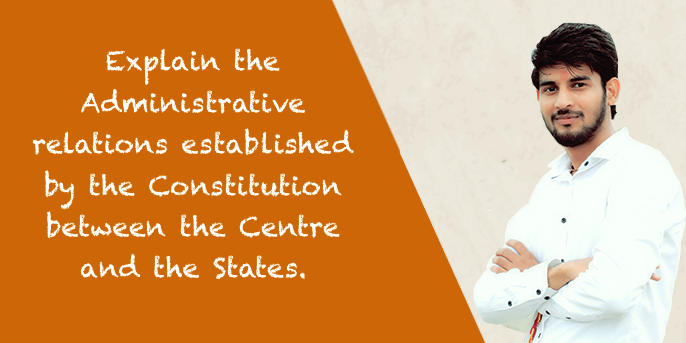Enumerate the provisions of the Constitution regarding the administrative relation between the Union and the State. Or Explain the Administrative relations established by the Constitution between the Centre and the States. Does it appear from the relevant provisions of the Constitution that it provides to establish the control of the Centre over the States?
Ans. Administrative relation between the Union and the State.—The Constitutional provisions providing for the administrative control of Centre on States shows unitary bias of the federal structure of the government. The relation between the Union and the State may be classed under two heads—(i) during emergencies, and (ii) in normal times.
(i) During proclamation of any emergency, the Union assumes effective control over the State or States, as the case may be. The autonomy of the State or States is suspended and the Government of India functions as a unitary Government during the emergencies.
(ii) The supremacy of the Union over the States is assumed in normal time also. Articles 256 and 263 provide for Union control over States even in normal period through the following ways :
(1) Direction by the Union to the State Governments.
(2) Delegation of Union functions to the States.
(3) All India services.
(4) Grant-in-aid.
The broad principle regulation as such shall be so exercised as to ensure compliance with the law of the Union and as neither to impede nor to prejudice the executive power of the Union.
The executive powers of the Union extend to the giving of such directions to the State as may appear to the Government of India necessary for the aforesaid two purposes (Article 256]. The executive power of the Union also extends to the giving of directions to a State as to the construction and maintenance of means of communication declared in the directions to be of national or military importance or as to the protection of railway within the State. [Articles 256-257]. The President may, with the consent of the Government of a State, entrust either conditionally or unconditionally to the Government or to its officers, functions in relation to any matter to which the executive power of the Union extends.
A law made by Parliament which applies to any State may notwithstanding that the Legislature of the State is not competent to enact such law, confer powers and impose duties or authorise the conferring of powers and the imposition of duties upon the State or officers and authorities thereof.
The Constitution provides that the Government of India shall pay to the Government of the State such moneys for the discharge of the aforesaid functions or duties as may be agreed upon or as may be decided by an arbitrator appointed by the Chief Justice of India to be the costs incurred therein (Article 258).
Full faith and credit shall be given throughout the territory of India to public acts, records and judicial proceedings of the Union and of every State (Article 261).
If a State fails to execute any lawful direction ofthe Union Government, the President may regard such non-compliance as failure of the Constitutional machinery in the State and may proclaim an emergency under which the Union of India may assume the executive and legislative control of the State.
Disputes relating to inter-State river.—Parliament may also by law provide the adjudication of any dispute or complaint with respect to the use, for distribution or control of the waters of any Inter-State river or valley. Parliament may also by law provide that neither the Supreme Court nor any other Court shall exercise jurisdiction in such dispute or complaint (Article 262).








